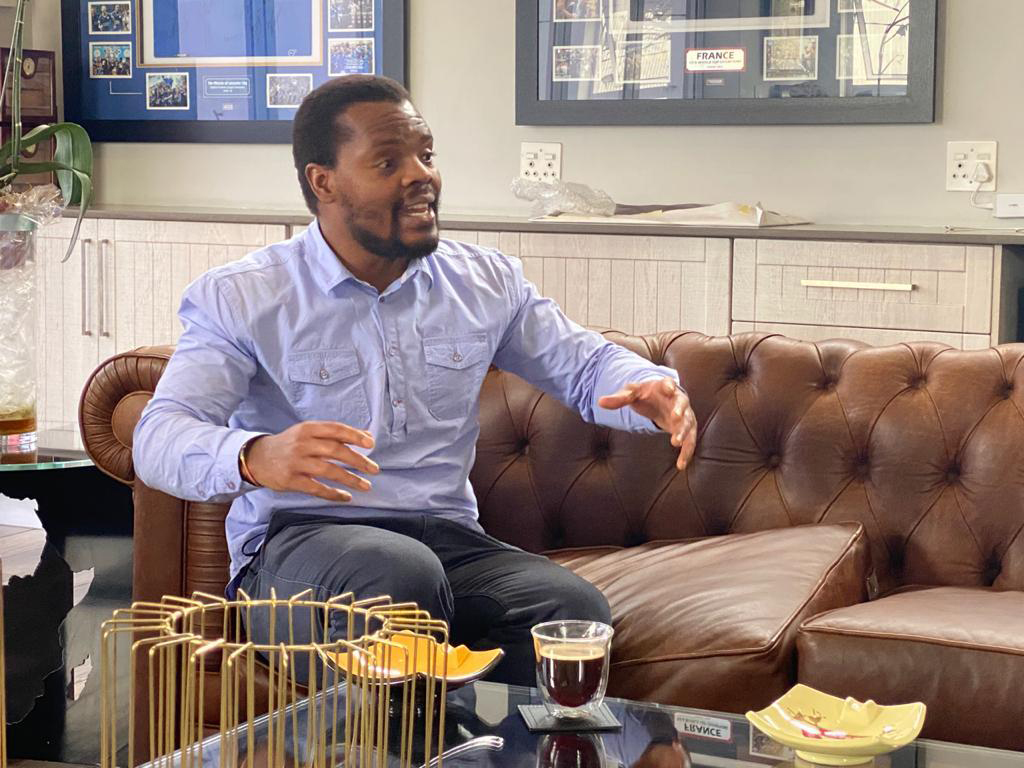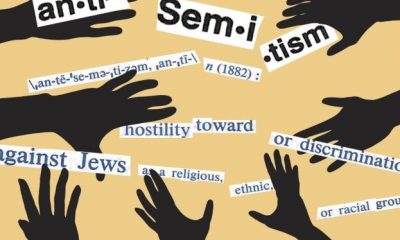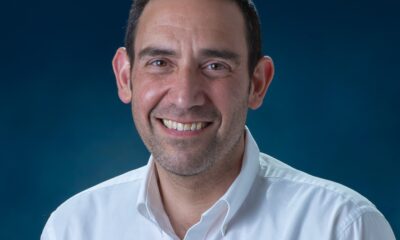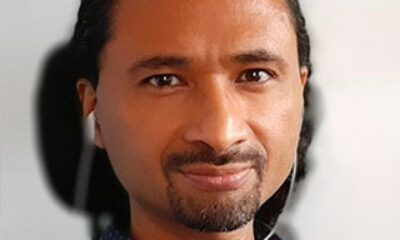
Featured Item

Dlamini puts “Hitler loving” past behind him
Published
3 years agoon
By
Nicola MiltzSix years ago, infamous campus rabble rouser and Fees Must Fall student activist Mcebo Dlamini was a fiery, Israel-bashing antisemite prone to hurtful and divisive words, including his love and admiration for Hitler.
Today, he appears to be a different man. The erstwhile University of the Witwatersrand (Wits) student representative council president says he has had time to reflect on what he now admits was a shameful and misguided period in the impressionable springtime of his political career.
“I was naïve and overwhelmed by the space I occupied as a young leader. I lacked a role model and mentor to guide me,” a repentant Dlamini told the SA Jewish Report this week.
Just two days before the Day of Reconciliation on 16 December, the South African Jewish Board of Deputies (SAJBD) accepted a written apology from Dlamini and engaged in mediation with him, facilitated by the South African Human Rights Commission (SAHRC). It was a poignant moment – many years overdue – that has been praised as an example of true reconciliation.
The mediation took place at the Johannesburg Holocaust & Genocide Centre (JHGC), where Dlamini was introduced to the horrors of the Holocaust and the Rwanda genocides following a facilitated educational engagement with the permanent exhibition at the JHGC.
“It made a huge impact,” he said this week.
“I felt a big sense of relief when my apology was accepted. I never thought this would end amicably,” said Dlamini who was “very nervous” the first time he visited the offices of Zev Krengel, the vice-chairperson of the SAJBD.
“He thought he was going to be arrested,” said Krengel this week, as the two men sipped coffee together in his office and recalled the day last year when Dlamini arrived at his office hoping finally to make amends.
What motivated the passionate Swaziland-born firebrand, who was found guilty of public violence for his part on the 2016 Fees Must Fall protests, to apologise now?
“I found I was no longer in a position to be taken seriously,” he lamented this week.
“What I said weighed heavily on my shoulders and persistently blocked my growth in social-justice activism. I found I couldn’t touch lives because I had destroyed lives. I want to be a human-rights lawyer, but how could I talk about love, reconciliation, and peace when I had made these comments?”
The SAJBD lodged a formal complaint against Dlamini with the SAHRC in 2015. In April that year, Dlamini took to Facebook and wrote, “I love Adolf Hitler. In every white person there is an element of Adolf Hitler”.
Then, during a live interview on PowerFM in June 2015, he said of Jewish people, “They are devils. They are good for nothing. They are hypocritical … they are uncircumcised in heart.”
There were other comments. Each time, he seemed to get more followers on Facebook.
“You get carried away in that process, and no one tells you that what you are doing is hurtful and dangerous and can damage your future career,” he said.
Much of Dlamini’s childhood was in Kamhlushwa in Mpumalanga, where his mother introduced him to politics from a young age. “She taught me about Pan-Africanism, and politics was part of our lives,” he said.
Dlamini became swept up in the heady induction phase of student politics. He rose quickly through the ranks of the Progressive Youth Alliance (consisting of progressive students of the South African Students’ Congress, the African National Congress Youth League, and the Young Communist League).
“Apart from many issues, the Middle East conflict always comes up for discussion. There is a dominant pro-Palestine narrative which I realise is biased and one-sided,” he said, admitting that he became “damaged” by it.
Following months of introspection and discussions on the Middle East, he now understands that it’s a multi-faceted, highly complex affair requiring empathy and understanding on both sides.
This journey, he said, made him realise that in order to pursue the noble fight for human rights, he had to acknowledge and make amends for his own ill-informed personal biases and prejudices.
Towards the end of last year, Dlamini asked his comrade, Wits law graduate and Africans for Peace co-ordinator Klaas Masilo Mokgomole, to help him address this longstanding issue.
Mokgomole sided with the Boycott, Divestment, Sanctions South Africa movement at Wits until he was encouraged to learn about both sides following an educative trip to Israel and an ongoing commitment to understand the struggle.
Together with student leader Cebolenkosi Khumalo, they arrived at Krengel’s offices in November in the hope of reaching an amicable outcome. Krengel told the SA Jewish Report he was intrigued by Dlamini’s visit after so many years of unresolved animosity between Dlamini and the community.
“I was interested to hear what he had to say,” said Krengel, who was pleased when Dlamini showed genuine remorse.
Following a process of mediation, Krengel said, “The sincerity with which Dlamini acknowledged the hurt that he caused our community was palpable. This understanding prompted him to make an unequivocal apology which was truly remorseful.”
He told the SA Jewish Report that Dlamini recognised that the statements were antisemitic, hurtful, and offensive.
“This recognition together with his genuine apology enables us to heal from the hurt he caused. It’s important for us as a community and as South Africans to identify when genuine remorse is expressed. It’s equally important for us to accept a sincere apology of this nature as it enables us to move forward.”
In his written apology, Dlamini said, amongst other points, “It’s only in retrospect that I began to appreciate how much my statements were ill-advised and to a certain extent dangerous because they ignored the kind of trauma that they caused. My journey has made me appreciate that I was wrong, and there is no possible excuse for what I said and there can be no way to reverse how it affected others. What I can do is supplement my apology with actions as testimony that I’m truly remorseful.
“I’m committed to engaging with literature that will assist me in learning about the history of Jewish and Israeli people to understand why my sentiments were offensive. Once I have this in-depth knowledge, I commit to teaching others about the knowledge I acquired.”
He said he wanted to travel to Israel to gain an understanding of how the Jewish people’s present is shaped by their past.
“I have thought deeply about the kind of leader I want to be, and it’s definitely not a leader that spreads hate and rejoices at the misfortunes of others.
“This marks a new chapter for me, and I’m hoping I can move forward.”











Steve Marks
Jan 14, 2021 at 11:50 am
Too little too late
Steven Sidley
Jan 14, 2021 at 2:54 pm
Ah. This is a pleasant surprise. We like to think that people don’t change, particularly rabid anti-semites. They clearly can and do. We should always remember to leave that door open.
Larry Malin (please only publish to me as Laz}
Jan 14, 2021 at 5:49 pm
Amazing how people can “çhange” when they seen how offences they have committed will interfere with there future prospects/career/earning potential. This man also has a history of violent acts. I would not trust this apology much without evidence of deeds. So are complaints to the SAHRC dropped and what’s next a paid trip to Israel?
John Smith
Jan 15, 2021 at 1:09 am
Sounds like a well-rehearsed, career advancing story by a manipulative individual. How do you grow up ignorant of the horrors of the Holocaust?
Larry Smith
Jan 20, 2021 at 4:53 pm
Totally insincere and nauseous man,
with a hidden career agenda. He should be in theatre acting and performing